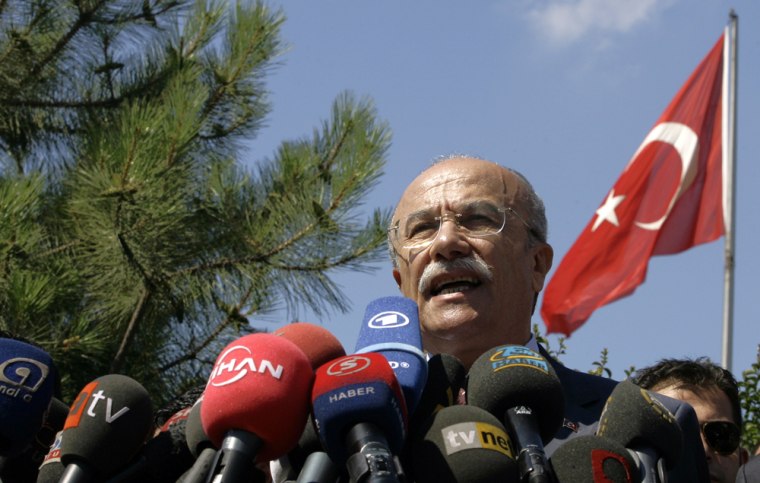Prosecutors indicted 86 hardline secular Turks Monday on terrorism charges for their alleged involvement in plots to topple the Islamic-rooted government, a chief prosecutor said.
Aykut Cengiz Engin said the 86 include at least one former general, along with journalists, academicians and businessmen. They were charged with either forming or being a member of a terrorist organization or with provoking an armed uprising with the aim of bringing down Prime Minister Recep Tayyip Erdogan’s government.
The suspects allegedly crafted plans to create chaos that would provoke a military coup and in turn topple Erdogan. Many believe the prime minister is eroding Turkey’s secular laws and making too many concessions to Christian and Kurdish minorities as part of the nation’s bid to join the European Union.
Struggle between government, secular groups
The indictment is seen as the latest episode in an ongoing power struggle between the government and secular groups supported by the military and other state institutions, including the judiciary and some trade groups. They accuse the government of attempting to raise Islam’s profile in Turkey.
A court must now decide within two weeks whether to open the case.
Turkey’s military, which staged three coups in the past, has criticized the government for allegedly eroding the secular system. But the top brass is believed to have controlled hawks within its ranks by occasionally issuing harsh statements against the government to appease them.
Without the backing of the military command, analysts say it is extremely difficult for retired generals to stage a coup and such attempts in the past have always failed. The military itself has always returned power to civilians after restoring order following the coups.
But the alleged plots reveal dimensions of the uneasiness and animosity felt toward the government and if confirmed would prove an attempt to overthrow the government, even as the government spearheaded efforts to strengthen democracy on the way to the EU.
The coup plots are being taken seriously because two previous army takeovers in Turkey — in 1960 and 1980 — were preceded by periods of civil strife.
The suspects were detained as part of an investigation after police uncovered a cache of hand grenades at the house of a retired noncommissioned officer in Istanbul last summer.
Renegade agents within the state
The investigation was deepened after Erdogan vowed to crack down on shadowy “deep state” gangs — networks of renegade agents within the state, driven by hardline nationalism, who may be taking the law into their own hands to target perceived enemies.
Three prosecutors have unveiled what they say is an intriguing net of ties between members of a hardline secularist and nationalist group, called “Ergenekon,” which takes its name from a legendary plain in Central Asia, from which Turks are believed to have emerged.
The prosecutor said the group is allegedly behind the 2006 attacks on the administrative court and the pro-secular Cumhuriyet newspaper, which infuriated secularists and led to protests against the government.
Engin said the 2,455-page indictment also accuse suspects of possessing explosives and arms as well as obtaining classified documents and provoking military disobedience.
The prosecutor said an additional indictment is being prepared against a dozen more people, including two senior retired generals, who were arrested in early July for their alleged ties to the group.
Erdogan’s government is facing possible closure by the Constitutional Court for alleged anti-secular activity. The country’s prosecutor also wants Erdogan and 70 other party members banned from joining a political party for five years.
The government’s attempt to permit Islamic-style head scarves at universities — which the Constitutional Court last month ruled was against the secular constitution — was the main pillar of the case against the party.
Erdogan’s party, formed in 2001 by politicians who once belonged to Turkey’s Islamic movement, denies it has an Islamic agenda.
